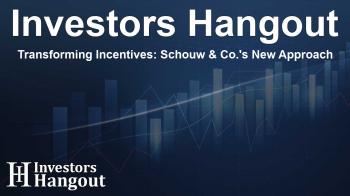Transforming Incentives: Schouw & Co.'s New Approach

Restructuring the Incentive Programs at Schouw & Co.
Since the early 2000s, Schouw & Co. has implemented long-term incentive programs aimed at rewarding senior management across its various entities. In recent years, there has been a notable shift in how these programs are structured, particularly with the introduction of new performance-based criteria that directly connect rewards to the companies' individual performances.
New Framework for Long-Term Incentives
In 2024, Schouw & Co. revised the setup of its long-term incentive program for its parent company’s senior managers. Traditionally share-based, this program is now transitioning to the Performance Share Units (PSUs) model, a method increasingly favored by other significant Danish companies. This change signifies a strategic alignment with broader industry practices and aims to boost managerial performance.
Purpose of the Restructuring
The central goal behind restructuring the incentive program remains clear: to foster value creation for Schouw & Co. by aligning the incentives of senior management with the interests of shareholders. Such alignment is crucial for ensuring sustained growth and competitiveness in the market.
Details of Performance Share Units
The revised program includes three senior leaders from the parent company, initially assigning a total of 18,600 PSUs. Notably, the CEO, Jens Bjerg Sørensen, will receive 12,200 PSUs. The PSUs provide a conditional entitlement to shares at a future date, thus serving as a long-term incentive.
Vesting and Conditions
The PSUs are subject to a vesting schedule that lasts until the annual report’s approval for the fiscal year 2027. Furthermore, the participant's total PSUs cannot exceed 75% of their annual salary, ensuring a balanced approach to reward structures. This cap is intended to maintain motivation while managing financial implications for the company.
Performance Metrics and Evaluation
The company's ultimate financial performance during the vesting period determines the actual number of shares granted, which could range between none and 100% of the initially allocated PSUs. For the 2025 program, key performance indicators (KPIs) have been established, focusing on EBITDA and Return on Invested Capital (ROIC), alongside a total shareholder return metric. These KPIs have been assigned weights to ensure a well-rounded assessment of financial health and performance.
Financial Implications
Based on the current share valuation, the potential theoretical worth of the incentive program could reach up to DKK 12 million. It’s essential for shareholders to recognize that while aggressive performance measures are in place, the program utilizes treasury shares and is listed at zero value on the company’s balance sheet.
Employment Conditions for Participants
To retain their PSUs, participants must remain employed by the Scheouw group throughout the vesting period, adhering to all program regulations. If an employment relationship ends during this timeframe, the designated individual will still retain a proportionate number of their PSUs as long as they are classified as a Good Leaver, reflecting an understanding of fair treatment during transitions.
Contact Information for Inquiries
Aktieselskabet Schouw & Co.
Jørgen Dencker Wisborg, Chairman of the Board
Jens Bjerg Sørensen, President & CEO
For more information regarding this restructuring or any related queries, please contact Jens Bjerg Sørensen, CEO, at +45 8611 2222.
Frequently Asked Questions
What is the main goal of the restructured incentive program?
The primary objective is to promote value creation by aligning the interests of senior management with those of the shareholders.
How are Performance Share Units determined?
PSUs are based on the KPIs defined for the program and can vary from zero to 100% of the PSUs granted, depending on performance.
What is the vesting period for the PSUs?
The vesting period lasts until the general meeting’s approval of the annual report for the financial year 2027.
Can participants retain their PSUs if they leave the company?
Yes, if they are classified as Good Leavers, they can retain a proportionate share of their granted PSUs.
How does the company ensure alignment with industry standards?
By adopting the Performance Share Units model, Schouw & Co. aligns its incentive program with practices common among leading Danish listed companies.
About The Author
Contact Caleb Price privately here. Or send an email with ATTN: Caleb Price as the subject to contact@investorshangout.com.
About Investors Hangout
Investors Hangout is a leading online stock forum for financial discussion and learning, offering a wide range of free tools and resources. It draws in traders of all levels, who exchange market knowledge, investigate trading tactics, and keep an eye on industry developments in real time. Featuring financial articles, stock message boards, quotes, charts, company profiles, and live news updates. Through cooperative learning and a wealth of informational resources, it helps users from novices creating their first portfolios to experts honing their techniques. Join Investors Hangout today: https://investorshangout.com/
The content of this article is based on factual, publicly available information and does not represent legal, financial, or investment advice. Investors Hangout does not offer financial advice, and the author is not a licensed financial advisor. Consult a qualified advisor before making any financial or investment decisions based on this article. This article should not be considered advice to purchase, sell, or hold any securities or other investments. If any of the material provided here is inaccurate, please contact us for corrections.

